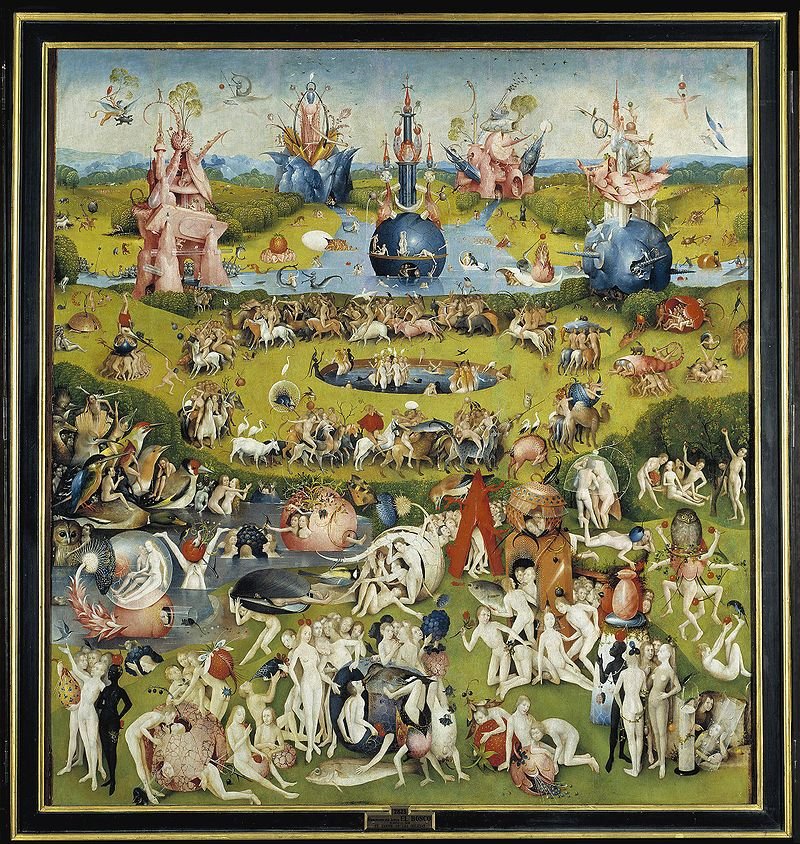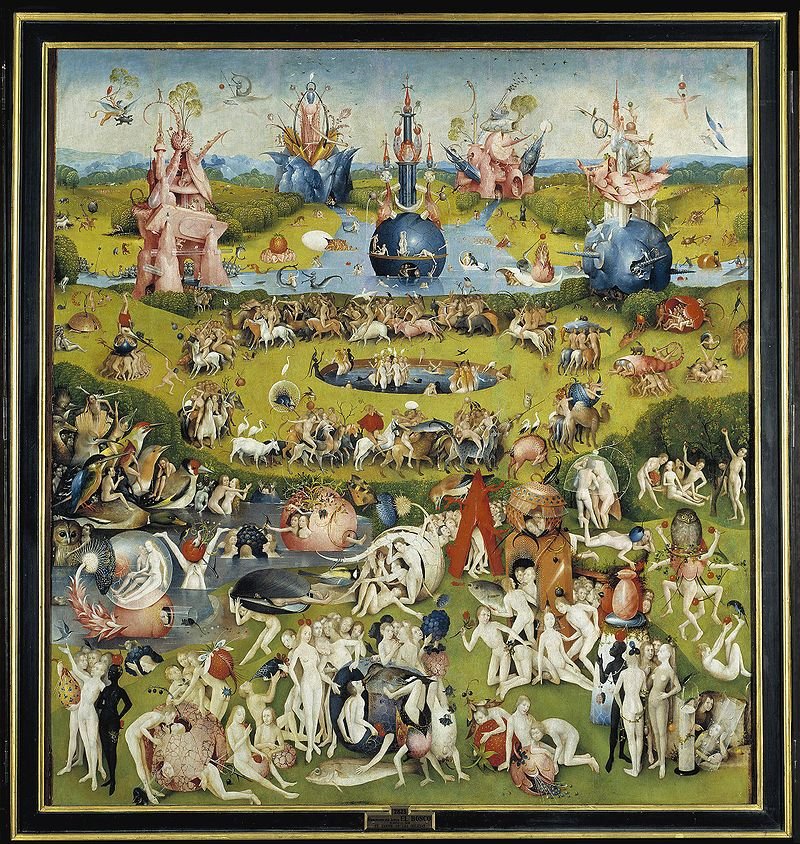DECONSTRUCTION OF FAITH & DOUBT: HOW UNCERTAINTY SAVED MY CHRISTIANITY

Let’s be honest – my faith would be different if I thought every story reported in the Bible was historically, factually and literally true. My faith would be different if I thought that the seven-days creation model was scientifically accurate, that God saved a few people from a flood which covered all Earth, that all the prophecies found in the Scripture were either fulfilled or going to be fulfilled literally. My faith would be different if I was certain that every word of Jesus recorded in the Gospels was actually pronounced by the historical Jesus.
It would be different. But would it be better? Would it be stronger?
Fundamentalist fundaments:
‘It’s a lie that faith has no foundation’ I was told at my first church, ‘real faith stands on proof and experience’. That was a nice change after cultural Catholicism, where you took dogmas ‘by faith’, which practically meant taking them without much consideration and without translating them into real life too much. Not any more: our faith was proof-based. We had shelves filled with ‘proof’: publications disputing evolution and arguing for young-Earth creationism, supporting historical reliability of the Gospels, explaining how Biblical manuscripts were perfectly preserved in their original forms, along with books full of accounts of supposed miracles and life testimonies of American evangelicalism superstars.
If you’re here, you may know what I’m talking about.
I bought all of that, because I thought it had to come in one package with what I was experiencing, and what I was experiencing felt very real. What I was experiencing felt divine. And I believe it was.
If you’re here, you may know what I’m talking about.
Well, sure, the books on the shelf weren’t all the proof available. They weren’t even the main proof. In the centre there was your life, your personal experience, the change, the revolution God had caused in your reality. ‘I believe the Bible is true, because it works in my life’ went the slogan.
That kind of proof was right there, in front of our eyes: a good part of our group consisted of people, who had their lives saved by faith; saved from addictions, crime and a lifestyle that would have soon literally ended their troubled resumes, had they not met Jesus.
That kind of proof was closely intertwined with the external one, with the doctrines of what the Bible is: the inerrant Word of God. An attack on historicity of any event in the Bible would be an attack on the very foundation of your life. It would be the devil’s trick: if you compromise one thing, you will soon start doubting everything else, and before you notice you’re back to your sinful lifestyle and going to hell.
For some people, this is what faith is: a house of cards, all or nothing. Take one element out, and everything is going to collapse.
Yes, it’s true I was unfortunate to land in a fundamentalist group. The evangelicals denying evolution or the age of the universe are indeed a minority. But even given that, while there is some more space for nuance in interpreting some bits of the Bible, the model of faith often remains similar.
That model of faith makes you afraid of doubt and scared of change. It squeezes your stomach uncomfortably when you hear a convincing argument against anything you believe. It makes you accept even a poor answer to it, as long as it saves you from the dangerous process of redefining and reevaluating. The less you doubt, the more submitted to God you are, and the more submitted you are, the more God can work in your life. In this paradigm, disengaging from doubt is somewhat heroic – it helps to stand firm spiritually despite the evil work of your human, imperfect intellect.
…but can Faith be different?
As you can guess, it’s not the kind of faith I share. Not any more.
My faith is different. But is it weaker? Is it worse? Is it less spiritual?
The process was easier for me, I have to admit that. Easier than for many other people. I didn’t grow up in an evangelical bubble somewhere in the US south. I didn’t have to worry about being kicked out of a club, a social network, which was all I knew. I started looking at things critically at an early stage of my Christian journey. Not like it was all easy for me, not like I didn’t get messed up and traumatised by Christian culture, but hey, it was nothing compared to some stories.
Maybe that’s why I don’t like calling the process ‘evangelical deconstruction’.
I’ve got an impression that ‘faith deconstruction’, a hot-topic in the evangelical world, exists only because many people were served the kind of Christian faith I described, the faith discouraged from questioning, the faith that needs to be simple enough to be preached in 3 minutes before an ‘altar call’.
If that’s your faith, then once you finally change your mind about one thing, it opens the floodgates. Bang! You’re deconstructing! You’re deconstructing every aspect of your faith, everything you life stood on. Only God knows where deconstruction will take you. Of course unless you end up at Open Theism, because in that case even God didn’t know where it would take you…
I dare to say that a level of deconstructing should be the default. Unchanging faith isn’t serious. Unchanging faith is dead.
…and what difference does it make?
There’s one Biblical belief which seems to be held universally in the West, among people of all faiths and people of one. That belief goes straight to Jesus’ words in the Gospel of John. The belief is simple: Truth makes things better. Truth sets free.
It is the ‘truth sets free’ principle that made the New Atheists write books and go around on speaking tours. They believe their truth can make a positive change in people’s life by setting them free from oppressing beliefs and anti-intellectual constraints, and that the truths of science will lead us towards a better age.
It’s the same principle that makes countless missionaries go around proselytising and that makes religious institutions push political agendas.
It’s the same principle that makes me type this words now, with Bob Marley in the speakers and mountains behind my window. Hello.
You become what you worship. The picture of God you carry shapes you relationship with God, and that relationship shapes you.
If you believe a judgmental and punishing God is true, you become more judgmental and less forgiving yourself. If you believe a loving God is true, you will tend to be more graceful towards shortcomings of others and your own. With time, the two beliefs will affect different areas of your brain and literally shape it differently. No jokes, science!
It was a bliss when I became a Christian, got saved, born again, you name it. It did change me positively, no doubts about that. But now, from the perspective of time, I still had a way to go. I still had a good deal of notions that needed changing while in the same time I was served another good deal of them at the church I was attending.
How naïve would it be to think that set of beliefs I held in the beginning was exactly the right one?
I do believe in the ‘set free’ moment, a decision by grace. But I also believe in the ‘set free’ process of change.
Am I beating around the bush? Are you getting lost?
…ok, ok, but how EXACTLY does it make a difference?
I used to believe that loving God would send people to an eternal Hell, if for whatever reason they don’t manage to figure out their salvation on this Earth. Now I think that things are much, much more complex around this topic. I think hope for salvation for all is at least an acceptable option. That stops the weird feeling of guilt about not doing enough about people losing their eternal life. That helps me to see God as much more loving, just, and powerful.
I used to see the world as a huge battleground between God and Satan, where everything had to be on either side. Now I like a nuance a little bit more. It saves me a lot of dissonance when, for example I met nice non-Christians living good lives. It lets me play Bob Marley from time to time without fear of being affected by spiritual powers behind the evil Rastafari cult. It lets me appreciate God’s truth and goodness outside of the Christian bubble. That helps me to stay both: sane and tolerant.
I used to think that ‘exposing’ the lack if historicity of a Biblical story would prove the Bible to be unreliable and not inspired. I used to think that every part of the Bible had to be doctrinally consistent with the rest of it. Now I can appreciate the depth and the richness of it through cultural and historical lenses of Biblical scholarship. Now I can appreciate the joint work of imperfect people and a perfect Creator, patient and flexible enough to accommodate human shortcomings throughout the process of text composition. That makes me less proud and more aware of the possibility of myself making errors.
I always had certain doubts about the Trinity and elements of Christology (who doesn’t, please tell me?). Now I can still have them without fear of ‘losing my salvation’ (or the right to attend church) if I don’t get the doctrine exactly right. Now I feel it is alright to explore different views, and to admit that in the end I actually don’t exactly know what I believe in. I think God may appreciate the struggle.
I do believe in these cases I’ve got closer to the truth, and that it has set me free more.
But how naïve would it be to think that the set of beliefs I hold now is exactly the right one?
My faith is different. There’s no ‘Bible says it, I believe it’ for me now. I’m less certain about a whole long list of things. Or, at least, I feel less compelled to pretend I am certain about them.
But no, my faith isn’t weaker, or worse, or less spiritual.
I hope it’s the opposite. And oh, it’s more honest.
That’s almost it. In the end, I want to state one thing very clearly:
… and what really matters in the end?
I don’t believe that the point of walking with Jesus is getting your doctrines right. I believe the point is becoming more like Jesus.
Of course, things you believe about God will affect your transformation. Getting your doctrines right may help it a lot.
But if we disjoint getting doctrines right from the main point, it will just make us proud pricks who feel superior to the grey thoughtless mass of fundamentalists.
I know many amazing Christians holding horrendous beliefs. My guess is that they stay amazing despite their credos, but it’s not like I’m sure of that. I know many Christians of nice beliefs, with whom I wouldn’t necessarily want socialise even over a cup of tea.
You get what I mean, right?
In the end (this time for real, I promise!), I (again) want to state just one more thing very clearly:
I don’t believe in doubt being a virtue on its own. I don’t believe in it being the destination. I actually don’t really enjoy the state of doubt.
I just think it to be bloody useful and necessary on our way. It’s unavoidable. Thank God.
I don’t know if holding this view qualifies me for a good agnostic. I try to be agnostic about my agnosticism. Maybe that qualifies me for an agnostic even more?
Überagnostic? Metaagnostic? Christian Agnostic?
I don’t know. You judge.

